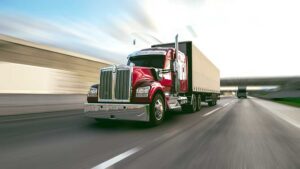Long-haul truck drivers spend extensive time on the road. Because of this, they face significant health challenges due to physical and psychological stress — including fatigue, social isolation and time pressures — that impact their overall well-being.
Tobacco use as a coping mechanism
Studies show that long-haul truck drivers are twice as likely as those in other occupations to use tobacco cigarettes as a coping mechanism. Many smokers say that first drag on a cigarette “really gets them going” in the morning — while at the same time noting that stopping for a smoke break helps them relax.
Regardless of the individual’s reaction to nicotine, they’re exposing themselves and others to harmful toxins like nicotine and carcinogens found in tobacco smoke.
Here’s the cold, hard truth: Exposure to first-hand smoke (FHS) is the leading risk factor for lung cancer.
Combine this with second-hand smoke (SHS) and third-hand smoke (THS), and a smoker’s risk for lung cancer is increased by 23% compared to the general population, according to the American Cancer Society.
Drivers at increased risk
For long-haul drivers, this risk is further amplified because of the confined space of the truck cabin. Research shows that carcinogen concentrations in vehicles far exceed those than in private settings.
Despite the dangers, smoking in commercial trucks is only prohibited when hauling Class 1 cargo (explosives), Class 5 cargo (oxidizer and organic peroxide) and flammable materials. This leaves many in the trucking industry — regardless of whether they’re smokers —exposed to high levels of SHS.
Help wanted: New research study
Objective measures of hair nicotine uptake levels and data on long-haul drivers’ well-being have yet to be explored — until now.
Drivers, your help is needed for a study conducted by the University of Alabama at Birmingham, “Exploring Occupational Exposures and Health Risks Among Long-Haul Truck Drivers: Tobacco Smoke.”
The purpose of this research extends beyond assessing lung cancer risk; it also addresses truck drivers’ limited access to healthcare. Due to the demands of the job, many truckers are unable to seek timely medical care, leading to delayed diagnoses of illnesses. Reducing harmful exposures and improving their quality of life is crucial, and the first step is understanding the extent of their exposure.
The study, which is open to participants (both smokers and nonsmokers) who travel through or live in Alabama, involves a one-time session. During this session, each participant will provide a small hair sample (10 to 15 strands from the back of the head) and complete a survey. Participants’ hair nicotine levels will be analyzed to assess exposure among smokers, former smokers and nonsmokers who spend at least three nights a week in their trucks, while also evaluating worker well-being.
Participants will receive $50 for their time, along with access to the publication detailing the study’s findings upon completion. Findings may help shape smoking behaviors in truck cabins and smoking cessation strategies tailored to drivers, support improvements in air filtration systems, and promote routine cabin cleanings to reduce harmful exposure.
Interested in participating? Contact Cara Harris at [email protected] or 256-431-0165 for more information.
As a health and fitness advocate for the trucking industry, I hope more research opportunities like this become available. This type of research can help move driver health forward.
Bob Perry is a regular contributor to The Trucker. He has spent nearly the past four decades on a mission to educate professional drivers and share life-changing products and services to help them live healthier lives while on the road. Recognized throughout the transportation industry, from bus drivers to over-the-road professional drivers, Perry has played an important role in creating a paradigm shift helping regulatory agencies, private and public sector entities, and consumers understand the current health challenges of the professional driver. He has participated as a wellness advocate in several roundtable discussions, large audience groups and small forums as well as going “curbside” through a national truck stop tour.
Bob’s articles have been featured in The Trucker and a number of other national transportation industry publications and is the host of a weekly wellness call produced by Rolling Strong. Bob has been a regular guest on RedEye Radio and Land-Line Radio, and is often an invited guest on Sirius radio shows. He has been featured in the New York Times, Men’s Health Magazine, Drug Store News, American Road Magazine, WSJ, NPR, ABC National Radio, as well as hundreds of daily newspapers. He has appeared on television news shows across the nation, including a featured TV segment on ABC NightLine News.











